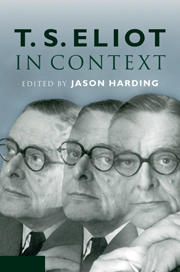Book contents
- Frontmatter
- Contents
- List of illustrations
- List of contributors
- Acknowledgements
- List of abbreviations
- Introduction
- PART ONE LIFE
- PART TWO FORMS
- PART THREE LITERARY CROSS-CURRENTS
- PART FOUR POLITICS, SOCIETY AND CULTURE
- 26 Politics
- 27 Economics
- 28 Anti-Semitism
- 29 Gender
- 30 Religion
- 31 Philosophy
- 32 Social science
- 33 Natural science
- PART FIVE RECEPTION
- Further reading
- Index
27 - Economics
Published online by Cambridge University Press: 05 August 2012
- Frontmatter
- Contents
- List of illustrations
- List of contributors
- Acknowledgements
- List of abbreviations
- Introduction
- PART ONE LIFE
- PART TWO FORMS
- PART THREE LITERARY CROSS-CURRENTS
- PART FOUR POLITICS, SOCIETY AND CULTURE
- 26 Politics
- 27 Economics
- 28 Anti-Semitism
- 29 Gender
- 30 Religion
- 31 Philosophy
- 32 Social science
- 33 Natural science
- PART FIVE RECEPTION
- Further reading
- Index
Summary
If there is a difficulty describing T. S. Eliot's economic context, it is that it spans micro-economic events almost invisible to historians and macro-economic events far larger than any individual. Eliot's relationship to economics involves the monetary struggles of a single newly wed couple, the fate of small circulation, almost voluntary literary journals and the serendipity of a personal career, as well as the rise and fall of national currencies, the emergence of labour politics effecting the decisions of the British parliament, the post-war dismantling of Germany's economy, the severe economic depressions of the 1920s and 1930s and Britain's long historical movement from an agrarian to a manufacturing and then a consumer society. Although no single individual could comprehensively understand the economic forces in play, writers across the political spectrum tried to diagnose and prescribe solutions for Britain's economic ills. Eliot's poetic, critical and editorial work records both the material impact of these events and the responses of intellectuals to them, even as economics shifted the ground of aesthetics, creative production, identity, politics and society.
Although Eliot's early poetry was concerned with social class, it was his initial experiences of living in London that ensured a deeper concern with economics. In America, he had grown up in an elite family and was educated at the best schools, with degrees and accolades from Harvard University preparing him for a successful career.
- Type
- Chapter
- Information
- T. S. Eliot in Context , pp. 275 - 284Publisher: Cambridge University PressPrint publication year: 2011
- 1
- Cited by



